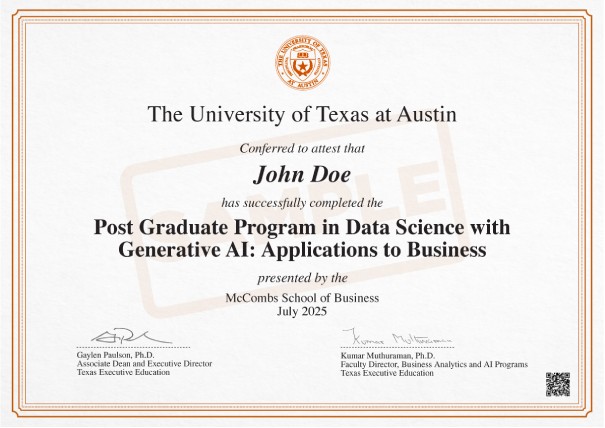Data Science and Business Analytics Online in the USA
Data is a multidisciplinary field primarily based on facts, trends, and statistical figures. In the emerging scope of data, Data Science is amongst the most prominent attributes of every sector and business operations as it is helpful in getting relevant insights and making business decisions based on it.
There has been a drastic technologic shift in a couple of years which results in the creation of huge amounts of data every single day. In a 2018 article, the World Economic Forum claimed that by 2025, over 463 exabytes of data will be created globally every day, the equivalent of 212,765,957 DVDs per day.
Data science mainly focuses on using the strategies to extract and dissect data specific to definite domains or sectors. It is more about giving targeted solutions rather than a quality solution applicable to all business operations. We can observe its use and functions in various sectors like healthcare, education, finance, retail, etc. With the help of its techniques, healthcare has found better solutions to take care of the patients, the education sector is providing better opportunities to students, the banking industry is more focused on providing the best customer service, and more.
What is Data Science?
The process of analyzing data and extracting useful insights from it to use it in the growth of businesses is Data Science.
It is not just a single term to understand. One needs to know the other various steps involved in the process, such as:
1. Business Requirements
It only makes more sense to collect data once you know where, how, and for whom it has to be used. Understanding business requirements is key as it helps companies to get critical information that can be used to fulfill their goals and objectives.
2. Data Collection
As per a recent study, over 2.5 quintillion bytes of data is generated every single day. The number is expected to grow exponentially with more businesses opting to capture and collect user data. It is important for businesses to understand the type of data to be collected.
3. Data Cleaning
Collecting data is not complete until it goes through check processes to retard any unnecessary data. This step is important in terms of reducing the complexity and also making sure that the collected data is efficient for the analysis.
4. Data Exploration and Data Analysis
Sometimes, there’s a need to employ data science tools to get the right understanding of the patterns of data. This process is called Data exploration. You can perform data analysis effectively only when you understand the patterns properly.
5. Data Modelling
The stage of Data Modelling is considered to be the most crucial one in Data Science. Based on all the insights and trends derived from data analysis and exploration, a predictive model is created. A lot of tests and training happens with this model to make sure it predicts precise outcomes from the data being input.
6. Data Validation
This is the stage of validation when the predictive model built in the previous stage is tested rigorously. The certain predictions that are produced from the model are then compared with the previous data and outcomes to judge the efficiency of the model. This stage is basically to test the model and find out all the existing errors, false predictions, inappropriate outcomes, and many more, only to work on them and fix the issues at the earliest. The model goes through several testing stages to improve the preciseness of outcomes.
7. Deployment and Optimization
The final stage of data science mainly involves the deployment of the model to the client and then seek feedback. Based on the feedback, the data scientists rework the errors and improvements after which it is good to go. That’s the whole process of data science.
Applications of Data Science Technology
The impact of Data Science Application is non-negligible in almost all domains. Businesses are embracing it at all given points to accelerate the growth. There are so many factors that have contributed to the rapid growth of Data Science and its use across the globe.
Here we list out a few industries and the benefits they are getting from the process of data science and its implications.
1. E-Commerce
E-commerce is one field that is not only applying Data Science but is growing immensely with its implications. A lot of e-commerce websites such as Amazon are using this process to make the most recommendations to the customers when they are surfing the website based on their search histories. It improves the entire user experience while shopping.
2. Fraud Detection
Financial sectors have a huge demand for Data Science in managing the indefinite financial transactions happening every other minute. The need of detecting fraudulent activities is real in this sector and hence the use of Data Science is important in sectors like banking, credit cards, loans, and many more. It is the ultimate solution to secure financial transactions and predict fraud.
3. Self-Driving Cars
We all know that Self-driving cars are the biggest example of functioning with the use of data. The designing of cars to perceive things on road well in advance and then moving according to the GPS is all because of strategizing the data properly.
4. Virtual Assistance
The current trending virtual voice assistants are all a result of the processes of Data Science. Gadgets like Google Home, Siri, Alexa, and many more, which have brought so much ease to our lives are all a result of correct outcomes of data. In fact, it has even replaced customer executive roles these days with a chatbot which is extremely quick and responsive at the same time.
Hence, it has become quite important to learn and data and its techniques as it might replace many existing jobs in the coming times.
What are the job roles offered to the candidates pursuing a Data Science Course Online in the USA?
Undoubtedly, all the job roles being offered in this domain are in high-demand all over the world. There’s a huge demand for data scientists and analytics professionals. Hence, many people are looking out for various Data Science Programs Online in the USA.
1. MIS Reporting Executive
2. Data Scientist
3. Data Analyst
4. Data Engineer
5. Statistician.
6. Data Architect
7. Machine Learning Engineer
Business Analytics
- Business Analytics is a broader domain that combines Artificial Intelligence, Machine Learning, and Big Data Analytics. However, all these terms have different meanings depending on the usage.
- The process of applying data and quantitative analytical techniques for deriving useful insights and making decisions based on them is known as Business Analytics. Data Science and Business Analytics are fairly interrelated to each other. Both the technologies are at the peak and have a huge scope in the 21st century.
- Under the domain of Business Analytics, there are mainly three types of analytics that are applied to get the desired results.
Descriptive Analytics
Descriptive Analytics as the name says derives insights by analyzing the historical data. It is one of the most important analytical techniques to perform advanced and complex analysis of data.
Predictive Analytics
Predictive Analytics is highly useful to derive reliable conclusions based on predictive models that are built to identify risks and connect data with effective actions.
Prescriptive Analytics
Prescriptive analytics is the stage after predictive analytics. It is built on predictive capabilities. It mainly includes the application of logical and statistical techniques to derive the most preferred insights.
The Demand for Data Science and Business Analytics Online Courses in the USA
In terms of science and technology, the United States of America is recognized as one of the most powerful and advanced countries in the world. The country has seen some amazing technological breakthroughs in every sector of businesses such as Healthcare, Physics, Engineering, Biotechnology, Telecommunications, and many more.
Looking at the growing pace of the technological industry, there is a huge demand and supply gap of Data Science and Business Analytics professionals in and across the United States. As and when more and more businesses start to adopt the data science route in the coming future, the demand will only increase, and thus learning and pursuing Data Analytics courses online in the USA is the need of the hour.
According to some statistics, there are 24000+ job opportunities available in the United States of America for the candidates pursuing a Data Science and Business Analytics course online.
So, don’t let this time slip through your hands. Grab this opportunity and enroll yourself in an online data science degree program or the best data science certification online.
Best Data Science and Business Analytics Online Courses in USA
There are plenty of institutes across the country that offer online courses in data science and business analytics, but not all provide the same learning outcome. While deciding upon a course that fits your requirement and expectation, it is important to keep in mind the objective and delivery of the course. Working professionals looking to transform their career in the first of Data Science and Business Analytics should look at mentored learning models, where a learner can interact with industry experts in a small batch and discuss real-life case studies for easy understanding of topics.
Rated among the best Data Science and Business Analytics online course, PGP-DSBA by UT Austin offers interactive mentored learning that provides collaborative as well as personalized learning.
Why choose Great Learning for PGP-DSBA online course in the USA?
1. Ranked #4
The Data Science and Business Analytics Online Program offered by the McCombs School of Business at The University of Texas at Austin has been ranked number 4 in the QS Business Analytics Ranking 2020.
2. Curriculum
The comprehensive program is designed to build expertise in the most widely-used analytics tools and technologies. The curriculum will help you learn concepts with real-world case studies by the faculty of UT Austin and the experienced industry leaders. This enables learners to get hands-on training and experiences in leading tools like R, Python, Tableau, Machine Learning and many more.
The live mentored sessions taken by the Industry Professionals of Data Scientists and Business Analytics are a major part of the curriculum that helps learners get a complete understanding of concepts.
3. Flexibility
The PG Program in Data Science and Business Analytics provides access to learners to learn at their comfort. With Great Learning’s proprietary learning management system (LMS) Olympus, learners can access course content with one single login that works on all the platforms. For professionals with a busy schedule, they can watch recordings of missed lectures at their convenience. The mobile app provides notifications on quizzes and assignments to keep learners updated and motivated throughout the program journey. The mentored learning sessions are kept at a time convenient to the cohort.
4. Faculty
Learn Data Science and Business Analytics from the top faculty of The University of Austin at Texas. The course is designed by the leading faculty from UT Austin, ensuring widely-used analytics tools and technologies are a part of the curriculum. The mentors for the program are leading industry experts with a strong practical understanding of core concepts of data science.
5. The Expertly-Designed Program
- brings esteem academicians and industry experts to help you develop the ability
- to independently solve business problems using analytics and data science.
Here are a few faculty profiles for your reference:
Dr. Kumar Muthuraman
Faculty Director, Center for Research and Analytics, McCombs School of Business,
The University of Texas at Austin. H. Timothy (Tim) Harkins Centennial Professor.
M.S & Ph.D., Stanford University.
Dr. Abhinanda Sarkar
Academic Director, Great Learning
B.Stat & M.Stat, Indian Statistical Institute. Ph.D. Stanford University.
5. Career Assistance
With dedicated career support, the online data science and business analytics program offers personalized 1:1 Career coaching and preparation for interviews. The career support team also provides assistance in building a resume to help you get the desired job. Learners can use their industry-ready portfolio, e-Portfolio to showcase their projects, skill, and tools.



 Speak with our expert
Speak with our expert
















 Certificate of completion from Texas McCombs
Certificate of completion from Texas McCombs No university certificate
No university certificate 








































